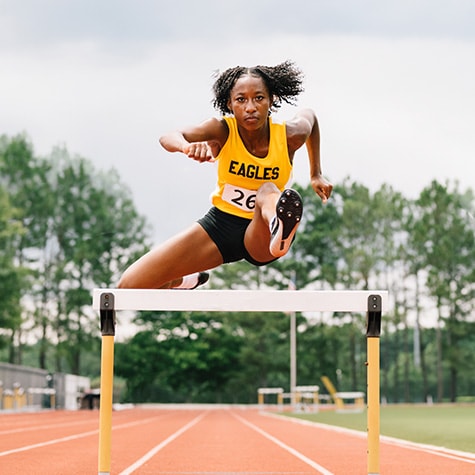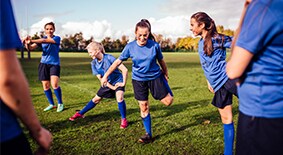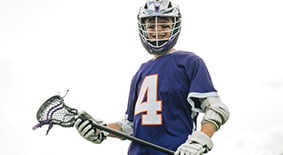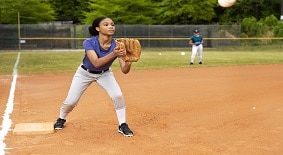Returning to Sports After an ACL Surgery or Knee Injury
Don’t let your teen athlete return to sports after an anterior cruciate ligament (ACL) surgery or knee injury before they’re ready. Learn how functional testing can help your teen reduce the risk of re-injury.
If your teen athlete has had ACL reconstruction surgery or a knee injury, you know how long and grueling the recovery process can be. Children and teens who have had to sit on the sidelines while healing are often eager to get back to their sport, but it’s critical that these athletes don’t return too soon.
Nearly 1 in 4 young athletes who sustain an ACL injury and return to high-risk sports will sustain a secondary ACL injury, most often in the first three months after return to play. It’s clear that improved rehabilitation and more specific return-to-play guidelines for our teen athletes will help reduce the risk of secondary injury.

Functional testing is a form of testing that takes place six months after ACL surgery to help determine whether your growing athlete is ready to return to sports. This type of testing is completed by a sports physical therapist, and it includes:
- Knee range of motion assessment
- Measurement of hip and thigh muscle strength
- Balance assessment
- Hop testing assessment
- Subjective psychological scoring to determine confidence levels in performing sport activities
- Landing and cutting mechanics assessment
After the testing is complete, athletes receive a Functional Testing Report to bring to their orthopedic surgeons at their six-month post-operative appointment. A sports physical therapist will make a recommendation on readiness for returning to sports based on an athlete's performance while considering the risk for re-injury.
Functional testing is a critical step following pediatric ACL surgery, as it allows our sports medicine team, including sports physical therapists, athletic trainers and surgeons, to help make sure each athlete is ready to safely begin a three month return-to-sport plan. Once your child or teen passes the functional test, a return-to-sport program is initiated.

Our experienced team can help get your child back in the game quickly and safely
Bringing your child to a Children’s physical therapist means that you’re now part of a team of highly qualified, skilled and experienced pediatric sports medicine specialists. Every team member is dedicated to getting the kids back to doing the things they love most.
Learn MoreFunctional testing empowers physicians with valuable data—before they allow a patient to return to sports. S. Clifton Willimon, MD, Chief of the Orthopedics and Sports Medicine Center and a Pediatric Sports Medicine Orthopedic Surgeon at Children's, says, “Many times, doctors allow kids to return to play based only on the amount of time that’s passed since surgery instead of considering factors like strength, balance and proper form during sport-specific movements, like jumping and landing.”
The Children’s team of orthopedic and sports medicine specialists is actively reviewing outcomes and exploring research opportunities to help young athletes recover and prevent future injuries. We’ve developed a library of 10-to 15-minute exercises, designed to help reduce the risk of an ACL injury while improving sports performance.
If your child or teen experiences a knee injury or is recovering from ACL surgery, it’s important for them to have functional testing before returning to sports.
At Children’s, our pediatric sports physical therapists will use the functional testing exam to help your athlete’s orthopedic surgeon determine with confidence when your child is able to safely resume playing sports.
Make an appointment with a Children’s pediatric sports physical therapist.
S. Clifton Willimon, MD, is a board-certified pediatric orthopedic surgeon who serves as the Chief of the Orthopedics and Sports Medicine Center at Children's and Medical Director of the Atlanta United FC Academy. He specializes in disorders of the knee, hip, shoulder and elbow. He practices advanced arthroscopic and reconstructive surgical techniques for the treatment of complex disorders of the hip, knee, shoulder and elbow as well as all sports-related injuries.
This content is general information and is not specific medical advice. Always consult with a doctor or healthcare provider if you have any questions or concerns about the health of a child. In case of an urgent concern or emergency, call 911 or go to the nearest emergency department right away. Some physicians and affiliated healthcare professionals on Children’s Healthcare of Atlanta team are independent providers and are not our employees.
Contact Us 404-785-KIDS (5437)



